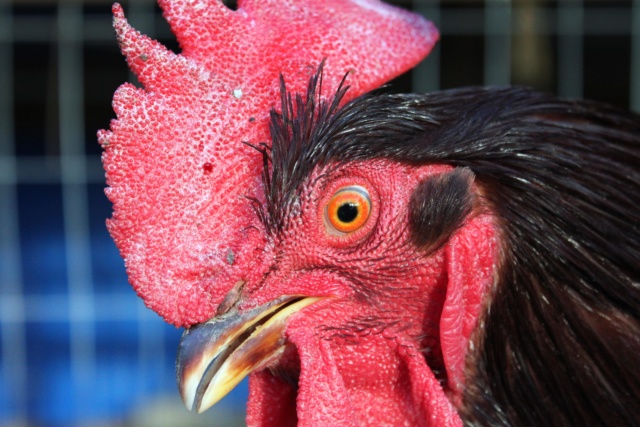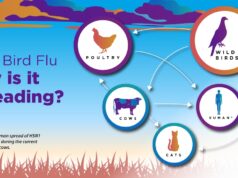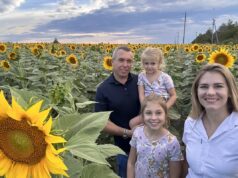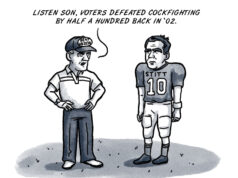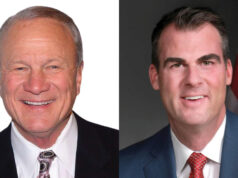(Editor’s note: This week, NonDoc will publish pieces examining the seven state questions on this November’s Oklahoma ballot. We have already published pieces on SQ 776, SQ 779 and SQ 780 & 781. The pieces are presented in a “filter” format that attempts to answer key questions about the measures and any campaigns being run for or against them.)
In what has become the most hotly contested state question on Oklahoma’s ballot, opponents of SQ 777 have employed some of the state’s heaviest political hitters, leading supporters of the measure to toss political cow chips back at them.
SQ 777 entered the broad public consciousness almost one year ago when people began hearing of an effort to preserve Oklahomans’ “right to farm.”
Around the same time, NonDoc began receiving letters opposing the measure, referring to it instead as the “right to harm.”
Over the ensuing 12 months, three campaign structures have popped up around SQ 777: one in support and two in opposition.
Earlier this month, NonDoc covered a debate on the measure at the Downtown OKC Rotary Club. More than one attendee noted “tension” in the room regarding SQ 777.
In short, the question asks voters whether to protect the agriculture industry in Oklahoma by requiring a “compelling state interest” for any future regulations:
The Legislature shall pass no law which abridges the right of citizens and lawful residents of Oklahoma to employ agricultural technology and livestock production and ranching practices without a compelling state interest.
If passed, the question would protect all laws on the books prior to Dec. 31, 2014, but future laws would be required to meet the highest burden in civil litigation or be ruled unconstitutional.
Supporters and opponents
SQ 777 is on the ballot at the behest of the Oklahoma Farm Bureau, the Oklahoma Cattlemen’s Association, the Oklahoma Pork Council, the Oklahoma Cotton Council, the Poultry Federation and similar industry groups. The Yes campaign’s website lists four sitting state representatives and one sitting state senator (sans Sen. designation) as endorsements.
While Big Ag is aligned in support of the measure, Big Animal Rights comprises one of the two groups opposed. The Oklahoma Stewardship Council draws the majority of its support from the Humane Society and affiliated donors, and former Oklahoma Attorney General Drew Edmondson is the primary political face of its campaign. Edmondson, who lost a 2010 Democratic primary for governor, spent more than a decade as AG trying to address poultry pollution in the Illinois River and other ag-industry issues. He has also represented the Humane Society on other matters.
In support of the Oklahoma Stewardship Council’s position on SQ 777, OU football coach Barry Switzer authored a letter sent to media for publication. The piece — posted first by NonDoc — argued that “Big Ag” is “trying to mislead voters,” and it emphasized the coaching legend’s opposition to puppy mills and other animal “atrocities,” which would be harder to address if 777 passes.
But not all those who oppose SQ 777 wanted to be associated with the Oklahoma Stewardship Council in this contentious campaign. Led by attorney and lobbyist Bud Scott, Oklahomans for Food, Farm & Family is a separate organization that opposes the measure on many of the same grounds as the Stewardship Council. Optics, however, are important to any campaign, and many farmers, ranchers and others — including the Oklahoma Municipal League — apparently preferred to avoid association with the Humane Society, which has a poor reputation among many in the industry.
The Oklahomans for Food, Farm & Family website lists 38 other organizations who oppose SQ 777, including several cities, relatively smaller ag groups and the Cherokee, Chickasaw, Choctaw, Muscogee (Creek) and Seminole nations.
Collateral damage
Any campaign puts those involved at risk for collateral damage, and SQ 777 has been no different. In addition to raising and spending significant money on both sides, campaign efforts have, at times, gotten personal.
For example, supporters of SQ 777 posted a photo of Switzer wearing a fur coat at an OU football practice as evidence of the coach being hypocritical on the issue of animal rights.
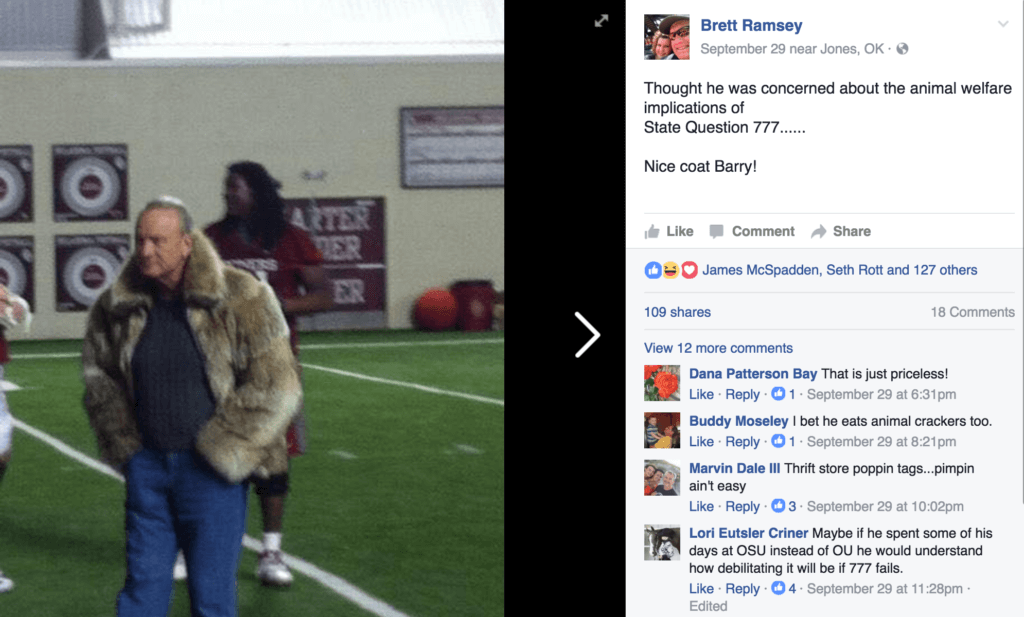
Oklahoma Pork Council lobbyist James McSpadden also shared a post showing Edmondson during his gubernatorial campaign in what appears to be a backward cowboy hat. Asked after the Rotary debate about the photo, Edmondson said he has many cowboy hats with which he is more familiar and only grabbed the black one that day to coordinate with the OSU homecoming parade.
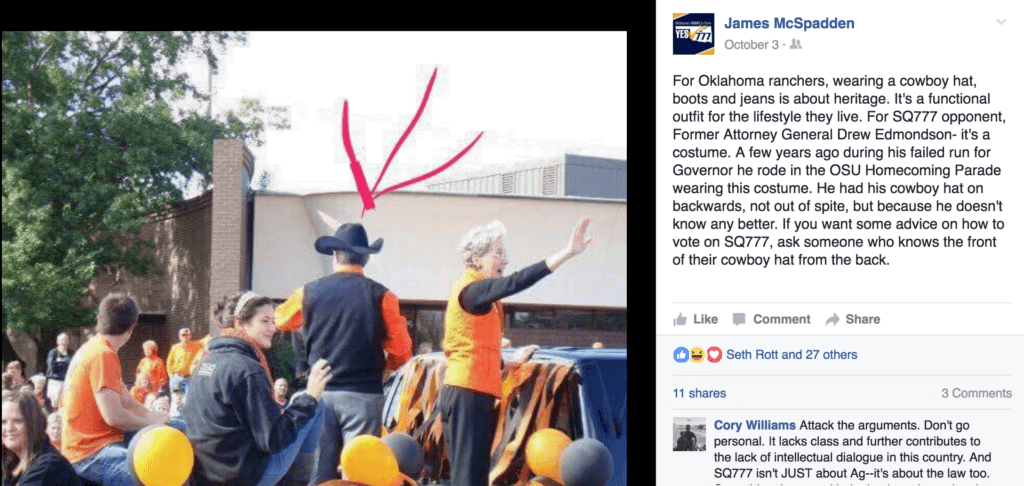
Last, NonDoc was also sent photos that appear to show Kirkpatrick Foundation board chairman Christian Keesee — a prominent business and philanthropy leader — wearing a headdress at some sort of dress-up party.
The Kirkpatrick Foundation has been promoting “knowledge” about SQ 777.
Collateral damage can cut both ways, however, and at least one NonDoc reader, Larry Lindquist, noted in the comments of the Switzer letter that he plans to speak out against SQ 777 with his pocketbook:
I’ve had my home owners (sic) and auto insurance with Farm Bureau for years. Because of Farm Bureau’s corporate and public support of this bill is why I will be making a change shortly. There’s more than one way to oppose something.
If SQ 777 does pass, expect constitutional challenges to be filed immediately. At the same time, opponents have argued that the measure would grant special protections to one industry, and they have warned that additional industries might also seek constitutional protection against legislative regulation.
(Update: This post was updated at 8:30 a.m., Thursday, Oct. 20.)









